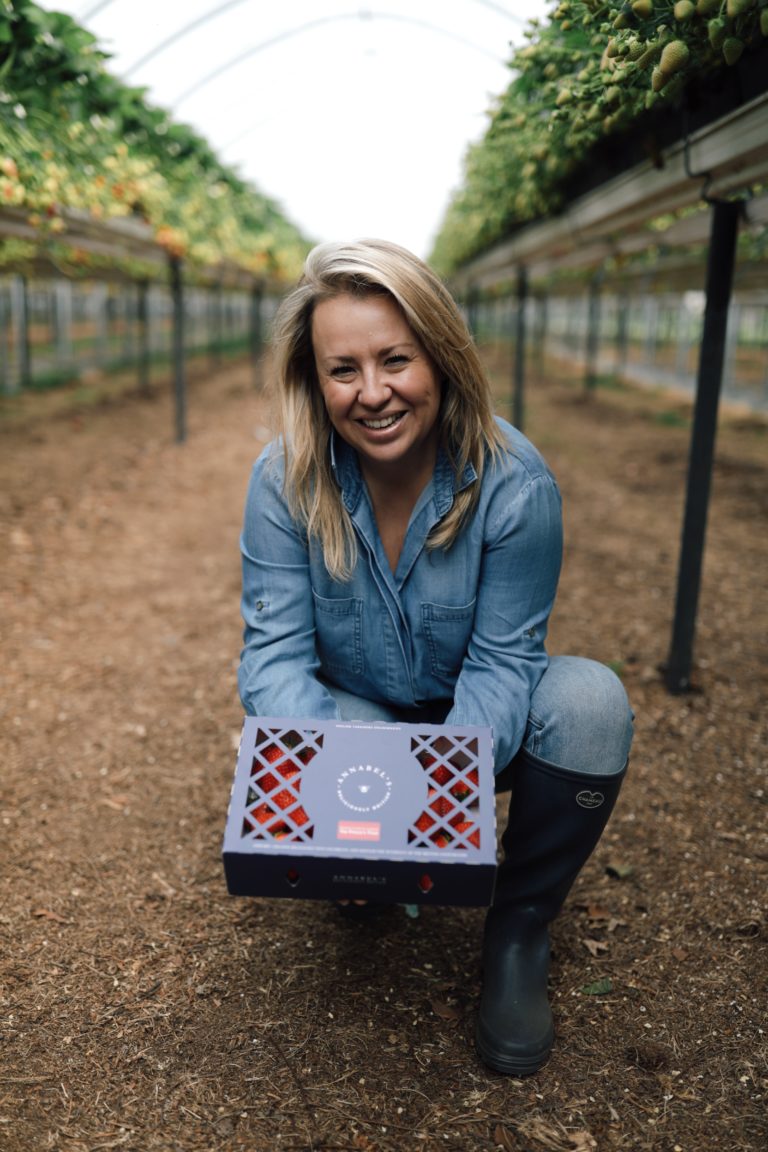Growing Strong: A Conversation with Farmer Annabel Makin-Jones on the Future of Agriculture
Annabel Makin-Jones is a curator, innovator, and champion of exquisite produce. She started off by growing and selling premium strawberries on her family farm and after she established a reputation for excellence, her enterprise grew rapidly. A decade later she set up her food brand Annabel’s Deliciously British and then her sister brand Tame & Wild, which produces fruit and botanical infused sparkling drinks using the ‘wonky fruit’ from her farm. Annabel now supplies the finest UK strawberries and other seasonal products including conserves, rhubarb, daffodils and honey to top luxury retailers including Harrods, Fortnum & Mason, Daylesford and Selfridges. With an irrepressible enthusiasm, Annabel creates delicacies that celebrate and sustain the diversity of the British countryside.

What is it about farming that you love so much?
To me, farming is an art and a skill. I feel very privileged to be able to watch different things grow from a seed to the very best of British produce that will feed the nation. It’s an honour to look after the countryside and work with nature, farming makes for a very interesting career as I’m seeing different things every day – I’m never bored!
What is your biggest achievement to date?
My biggest achievement would be my reputation within the industry, people trust me to provide high quality British produce that will always deliver.
Would you consider British farming practices the most sustainable way to produce food, compared to other countries?
I wouldn’t like to compare as it all depends on the environment and land around you. What I can say though is that a lot of countries seem to be very progressive in ensuring they’re farming as harmoniously as they can and to benefit the environment.
You have been a farmer your whole life, what has been the most difficult thing you’ve had to face?
I would say that now is the most difficult time for British farmers. We’re facing constant increase in prices due to the cost-of-living crisis with no support from the government. The large supermarket chains hold the power over farmers – many chains squeeze margins, meaning minimal profit for UK producers. The UK produces fruit and veg all year round, however some must be grown in glass houses which means prices will be more expensive for supermarkets. As an example, salads must be grown in glass houses in the winter due to the weather conditions, which uses CO2 and heating which is very expensive due to energy costs. Supermarkets will then opt to buy cheaper products outside of the UK leaving British farmers with no buy in or having to slash costs making little to no profit to compete.
What challenges, in particular sexism, have you faced as a female farmer? Do you feel you had to fight / work harder to get to where you are now?
Unfortunately, yes. When I first started practicing farming, sexism was absolutely rife, especially with older men who were quite traditional in both their lifestyle and agricultural approach. It has gotten better now though and there are more female farmers with almost 1 in 5 farmers being a woman. We still have a way to go but we’ll get there and there’s a really strong sense of community between us all.
There’s been lots of conversations on the advanced used of technology within urban farming, including hydroponics, vertical farming, solar panels & LED Lighting. Do you think any of these methods will cross over into rural farming if they haven’t already?
A lot of them, if not all of them, have already come into our practices. We have solar panels and rural hydroponics already in place but there’s always potential to look at new and innovative methods. It’s especially great to see more urban farming taking place, the more we can do to grow and help the environment thrive, the better.
Do you believe farming has had to become more sustainable over the past few years? Alongside your sustainable methods you have already listed, what else do you do to ensure your agricultural practices are as eco-friendly as possible?
Yes, over the past decade more and more people are discussing climate change and the importance of living a more conscious lifestyle. Customers want to know exactly where their food comes from, how it’s been made and how you’re trying to farm better, which is wonderful to see. It’s so important to be as transparent as you can be in everything you do, providing as much information as you can. Here at Annabel’s Deliciously British, we work to a zero-waste policy and use any waste in botanicals, preserves and packaging to create year-round productivity. The water in our 25-million-gallon lake sustains everything from insects and other wildlife to our strawberry crops with all produce free from any nasties!

Why is it so important to buy British produce / food?
UK farmers have the best food standards in the world. We should be encouraging the British public to back UK food producers and choose to eat produce based on what’s in season in this country, not only to support the UK trade but also to boost our own health. Multiple studies have found organic and seasonal food to be the healthiest for our bodies!
The fruit & vegetable crisis is ongoing, what can we do to help?
Where possible, only buy seasonal produce that has been grown in the UK.
If your chosen retailer isn’t stocking British produce, start asking them why. You can do this in-store and online.
Selecting products such as conserves and chutneys that are made in the UK using fruit grown in the UK. Ensure to read the label and ask about anything you’re not sure on!
Shop local. Your local greengrocer, farmers market, butchers and bakers are all great options to shop for your weekly groceries. Ask them about their suppliers and where they source their produce.
Support the NFU’s campaign to secure a supply of high-quality British produce.
What challenges, in particular sexism, have you faced as a female farmer? Do you feel you had to fight / work harder to get to where you are now?
Unfortunately, yes. When I first started practicing farming, sexism was absolutely rife, especially with older men who were quite traditional in both their lifestyle and agricultural approach. It has gotten better now though and there are more female farmers with almost 1 in 5 farmers being a woman. We still have a way to go but we’ll get there and there’s a really strong sense of community between us all.
There’s been lots of conversations on the advanced used of technology within urban farming, including hydroponics, vertical farming, solar panels & LED Lighting. Do you think any of these methods will cross over into rural farming if they haven’t already?
A lot of them, if not all of them, have already come into our practices. We have solar panels and rural hydroponics already in place but there’s always potential to look at new and innovative methods. It’s especially great to see more urban farming taking place, the more we can do to grow and help the environment thrive, the better.
Do you believe farming has had to become more sustainable over the past few years? Alongside your sustainable methods you have already listed, what else do you do to ensure your agricultural practices are as eco-friendly as possible?
Yes, over the past decade more and more people are discussing climate change and the importance of living a more conscious lifestyle. Customers want to know exactly where their food comes from, how it’s been made and how you’re trying to farm better, which is wonderful to see. It’s so important to be as transparent as you can be in everything you do, providing as much information as you can. Here at Annabel’s Deliciously British, we work to a zero-waste policy and use any waste in botanicals, preserves and packaging to create year-round productivity. The water in our 25-million-gallon lake sustains everything from insects and other wildlife to our strawberry crops with all produce free from any nasties!
Find out more: Annabel’s Deliciously British | Yorkshire Strawberry Farm (annabelsdeliciouslybritish.co.uk)
